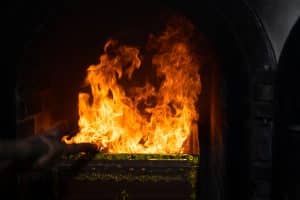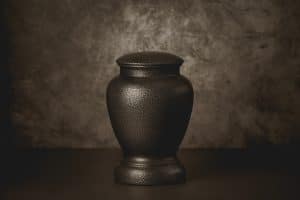 The cremation process:
The cremation process:
The word cremation comes from the Latin word cremo which means “to burn” – particularly the burning of the dead.
History of cremation:
In ancient Israel, sepulchers, tombs or vaults were often used for burial. The flesh eventually decomposed. The bones were kept (Joshua 24:32).
Cremation was introduced by the Greeks and Romans.
The early Christian church rejected cremation, partly because of its association with the practices of Greece and Rome.
In ancient Egypt, bodies were embalmed so that they would be preserved for the afterlife.
In ancient China, the dead were buried so the body could return to the earth and “karma” could be released into the world. This was their view of the soul.
When Christianity became the official religion of the Roman Empire, and the followers and leaders of other religions were either exiled or exterminated, burial became the only permitted method of disposing of bodies throughout much of Europe. Even though the burial of the body was a Chinese practice, it was perceived that we were returning to the dirt from which we were first created.
Modern burial practices follow more of the Egyptian process of embalming before burial. The blood is drained and the body is filled with chemicals to preserve the body for a few extra years. The body is then sealed in a coffin and vault. This means that the body doesn’t really return to the earth, at all. In other words, our modern burial method isn’t really the same as the idea practiced by the early church.
Modern Cremation
An Italian, Professor Brunetti, developed the first modern cremation chamber in the 1870’s. This triggered a movement towards cremation in Europe and North America which has continued to the present day.
In 1886, the Roman Catholic Church officially banned cremations. The Eastern Orthodox ecumenical patriarch of Constantinople stated in 1961 that: “There is no formal Orthodox rule against cremation, but there is a heavy weight of custom and sentiment in favor of Christian burial.”
 1 Samuel 31:11-13 — A Possible Mention of Cremation?
1 Samuel 31:11-13 — A Possible Mention of Cremation?
1 Samuel 31 describes the death of Saul. After being wounded in battle, Saul pleaded with his armor-bearer, “Run me through…or these uncircumcised Philistines will come and…abuse me.” When his armor bearer refused, Saul took his own sword and fell on it.
The next day, the Philistines found the body of Saul and cut off his head, stripped off his armor, and fastened his body to the wall of Beth Shan.
When the Israelites living in Jabesh Gilead heard what the Philistines had done, they retrieved the bodies of Saul and his sons and burned them. They buried the remaining bones under a tree at Jabesh. Some might consider this a reference to cremation.
Today, many people reject cremation because of its association with the ancient burial practices of pagans.
However, Christians must consider the following truths about the disposal of dead bodies in modern times:
1. The body will decay either by bacteria or fire. Neither form of disposal will preserve the human body indefinitely. Fire is quicker and some view it as a purifying agent.
2. Burial customs have changed many times throughout history. Ancient burial techniques aren’t necessarily the same as the modern process of embalming.
Embalming literally replaces the blood in the body with harsh chemicals. It’s fairly certain that the early church would have rejected this practice, as well. Modern Christians, on the other hand, have grown accustomed to it.
3. The incineration of the body will not affect what takes place at the Great Resurrection! Ancient pagans were preserving bodies for the afterlife. But according to Scripture, at the resurrection, the soul and spirit of man will be given a new body (Philippians 3:20-21; Romans 8:21-23; 1 Corinthians 15:37-43). Further, many people have died in fires, been lost at sea, died in explosions during war, etc., where their bodies were completely disintegrated. However, Revelation 20 says that there is coming a day when the seas and the earth will “give up” their dead so that everyone can stand before the Great White Throne.
4. Many people associate being burned with fire as being associated with judgement, since hell is described as a lake of fire, and fire was often used as a way of punishment by death. However, this argument is weak for several reasons.
First of all, throughout history, many people who’ve placed their faith in Jesus as forgiver of their sins and Lord of their life have died by fire.
Second, the “dead” who are thrown into the lake of fire have bodies that have long since deteriorated.
Third, while fire is used by God for judgment. It is also used throughout Scripture as a symbol of purification, sanctification and God’s presence.
For instance,
— The altar of God was kindled by fire (Leviticus 9:24) .
— A pillar of “fire by night” led nation of Israel (Exodus 13:21-22).
— In the book of Judges, after Manoah and his wife offered a burnt offering to the Lord, the angel of the Lord “ascended in the fire” (Judges 13:20).
— The Holy Spirit came on the day of Pentecost appearing as “tongues or flames of fire” (Acts 2:1-4)
— Jesus’ reference to Himself as the “light of the world” (John 8:12) and His followers being the “light of the world” (Matthew 5:14-16) is a reference to a candle or a lamp which featured a burning wick.
— In John 5:35 Jesus called John the Baptist, “a burning lamp.”
— Malachi says the “Sun” of righteousness will rise with healing in His wings (Malachi 4:2). This is a reference to the Messiah as the sun, which is entirely made up of fire.
In other words, fire is not only associated with judgment, it is also associated with God, God’s presence, holiness, the Holy Spirit, purity, light and Jesus!
5. We often say, “Jesus was buried.” The fact is his body was laid in tomb. The form of burial we use today of covering someone’s body with dirt was not the form of burial Jesus experienced or that which was practiced by early Christians.
6. As you can see, there are many ideas and arguments about this subject that counter the arguments of those who oppose cremation on the basis of it being an ancient practice of Greeks and Romans.
7. The fact is that the Bible doesn’t prohibit the practice of cremation — of disposing of a dead body through fire. Neither does this form of burial affect the afterlife in any way.
Based on all the above, cremation appears to be a matter of conscience and custom, not something God expressly prohibits. Therefore, Christians seem to have the liberty to consider this alternative when it comes to a form of burial.
—Dr. Bryan Cutshall
President, ISOW Bible College
To view courses in Spanish, click here.
 The cremation process:
The cremation process: 1 Samuel 31:11-13 — A Possible Mention of Cremation?
1 Samuel 31:11-13 — A Possible Mention of Cremation?